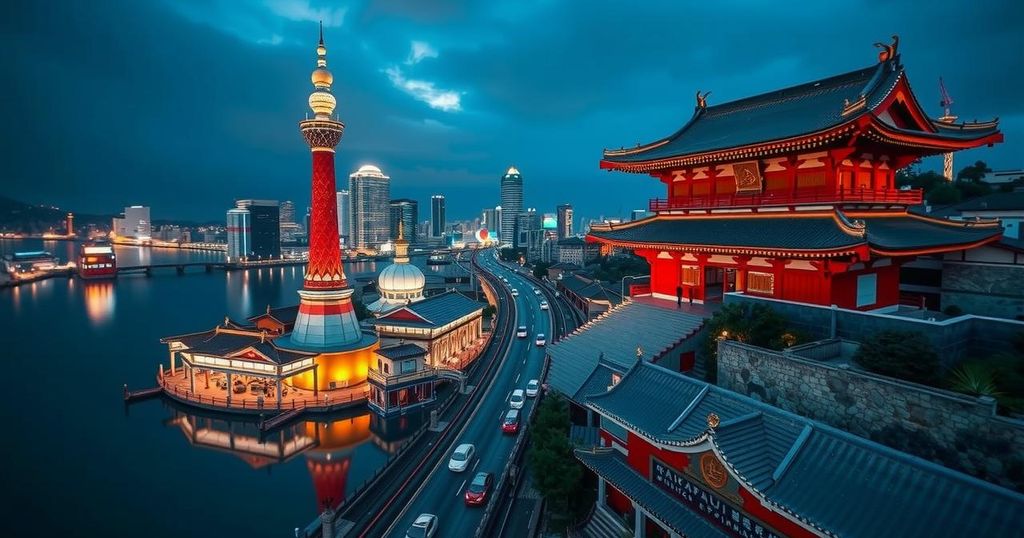Taiwan Foreign Minister: India’s Role Crucial in Countering China’s Challenge
Taiwan’s Foreign Minister Lin Chia-Lung stressed India’s strategic importance in uniting like-minded countries to counter China’s expansionist policies. He highlighted Taiwan’s collaboration with India in the semiconductor sector as a pivotal point in their partnership and called for an overarching framework for cooperation. As concerns regarding China’s authoritarian governance rise, Taiwan seeks stronger ties with India to safeguard democratic values and economic stability.
Taiwan’s Foreign Minister Lin Chia-Lung emphasized the crucial role of India in coalition efforts among like-minded nations in the Indo-Pacific region to counteract the growing assertiveness of China. In a discussion held before Taiwan’s National Day, Lin articulated that the Chinese regime, stemming from its authoritarian foundations, poses significant challenges to the established rules-based international order. During this critical period, as global attention turns to China’s assertive maneuvers in the Taiwan Strait and surrounding maritime zones, Taiwan is eager to collaborate with international partnerships such as AUKUS, Five Eyes, G7, and the Quad. This coalition aims to establish a cohesive defense framework across the region. Minister Lin highlighted the enhanced collaboration between Taiwan’s semiconductor industry and nations including India, Japan, Germany, and the United States. This strategy forms a cornerstone of the current Taiwanese government’s foreign policy, which seeks to develop three key chains: a security alliance chain, a non-China resilient supply chain, and a global democratic chain. He stated, “All these related countries are put under the same geopolitical framework and the reason [for this] is China’s rising power and its expansionism.” He further called for the establishment of an overarching cooperation framework that leverages the complementary economic strengths of both Taiwan and India, noting mutual concerns regarding Chinese expansion and supply chain dominance. Lin pointed out developments such as Taiwan’s Powerchip Semiconductor Manufacturing Corporation forming a joint venture with India’s Tata Group to underscore their commitment to creating a clean supply network, distancing from Chinese influence. Additionally, he urged India to implement initiatives that could attract Taiwanese businesses operating in China, such as offering a conducive environment for Taiwanese small and medium enterprises through trade agreements or economic incentives. Lin underscored the broader geopolitical context, detailing how China uses various initiatives, including One Belt, One Road and Digital Silk Road, along with military and economic pressure, to extend its global influence. He articulated, “The Chinese government is built on authoritarianism. So, this is no longer just different systems fighting each other, this is like the two different camps fighting for the future.” In a concurrent discussion, Taiwan’s Deputy Foreign Minister Francois Chihchung Wu affirmed the unique positions of the United States and India as the only nations capable of effectively balancing China’s regional ambitions. Although Taiwan and India do not maintain formal diplomatic relations, significant progress has been made in fostering political and trade collaborations through representative offices established in each capital since 1995. In 2023, the two nations experienced substantial bilateral trade amounting to $8.2 billion, with Taiwan recognizing India as its 12th largest export market.
This article discusses Taiwan’s perspective on the significance of India’s role in the Indo-Pacific political landscape, particularly in terms of countering China’s aggressive expansionism. The statements provided by Taiwan’s foreign minister, Lin Chia-Lung, reflect broader strategic efforts to unite nations with shared democratic values and concerns about authoritarian regimes. The changing dynamics in the region are underscored by economic cooperation, especially in technology sectors such as semiconductors, which are crucial for both Taiwan and India’s economic growth. The context highlights that Taiwan is seeking productive partnerships despite the lack of formal diplomatic recognition by India, establishing instead cooperative frameworks through economic and cultural connections. It also illustrates the potential geopolitical risks posed by China’s territorial ambitions, which affect various nations across the region.
In summary, Taiwan’s Foreign Minister Lin Chia-Lung has articulated the importance of India in the collaborative efforts among like-minded nations to address China’s expansionist policies and authoritative governance. During discussions highlighting the geopolitical challenges and economic interdependence faced by both Taiwan and India, mutual initiatives and enhanced cooperation were emphasized as vital steps towards establishing a cohesive defense strategy and a resilient supply chain. The developing partnerships within the Indo-Pacific framework reflect a collective commitment to uphold a rules-based international order in the face of growing challenges posed by China.
Original Source: www.hindustantimes.com








Post Comment